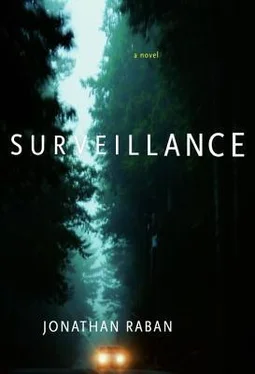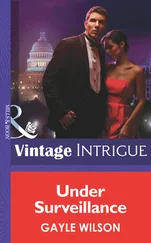“I wonder how it was when you took him home to meet your parents? He must have struck them as quite an odd bird.”
“Oh, they got on really well. My dad called him ‘the prof,’ of course, but then he saw how good Augie was with his hands. They’d spend hours out in the yard together, working on Dad’s Hudson. Augie tuned it right up, even though my dad was the engineer. Augie could fix anything back then, which was how he kept that old Ford of his going, and my dad looked up to him for that. He called himself a ‘shade-tree mechanic’—an expression he’d picked up someplace, and he used it a lot.
“I think we were the first real ordinary family he’d ever known, and he kind of glommed on to us: not just me, but Mom and Dad, too. We’d go on weekend outings together in the Hudson — it was a Hornet — me and Augie in the backseat, Dad and Mom in front. It was a funny way to go dating, I guess, but we’d drive up in the mountains, and Augie was always in charge of the campfire. He had a knack for that, could make just anything burn.”
When Lucy glanced over, Minna’s whole face was a smile. But the island was too narrow to contain her memories; they were almost back at Useless Bay when she said, “Dad and Augie used to go steelhead fishing in the spring…” and her voice trailed off as the house came into view. Lucy resolved to entice her into the Spider again later in the weekend.
The moment they walked through the front door, Lucy knew that Alida and Augie were gone: the house was no better than a Holiday Inn at holding the imprint of the human, and she could smell its vacancy. Minna, out of habit, called “Augie?” but the name came back on echo.
The sands were glazing over under the incoming tide. The two kayaks looked like one — a jerky water boatman, scuffing along the surface with its feet. Squinting at the glare, Lucy made out Augie ahead, Alida just behind him: identical in size, they looked married in their oblivious preoccupation with their own small world. She picked up the birdwatching binoculars from the patio table and had a hard time bringing the swimming image into sharp focus. The kayakers went from fuzzy to more fuzzy, then turned crisp. Both were wearing puffy orange life vests, she was glad to see. Augie’s paddles sliced the water as cleanly as knives; Alida’s splashed. She was saying something, and Augie turned his head. In close-up, they were a couple no longer, but grandfather and granddaughter — and no sooner had Lucy voiced that thought in her head than she wished it gone.
“She’ll be quite safe with him.”
She hadn’t realized that Minna was standing at her elbow. “Oh, I wasn’t—”
“Augie loves children,” Minna said, with exactly the same stress that he’d put on the same words.
ON THE SEVENTH FLOOR there was no sign of the fag actor or Lucy Bengstrom. Charles O let himself into 701, dumped his tools on the floor and his bunch of tulips on the table, then stepped into the bathroom and turned the lock.
The close, female stink of the place made him catch his breath. Both the windowsill along the edge of the bath and the glass shelf below the medicine cabinet were so crammed with lotions, scents, shampoos, gels, paints, creams, and ointments that a dozen women might be living in the apartment. He unscrewed the top of a perfume vial and held it gingerly to his nose. Wah! You could kill a horse with that one.
Two toothbrushes: good. Then he spotted a pink razor on the windowsill. He had to reach for it carefully with forefinger and thumb to avoid knocking over a whole bunch of little bottles with colored stuff in them. The razor looked as if it hadn’t been used for a long time; a cracked rime of old soap whitened its twin blades, and speckles of rust showed through the rime. Looking more closely, he found some short hairs embedded in the muck on the blades, too fine for beard stubble. He set the razor back exactly where he’d found it.
American women had hairy legs, like American men had hair on their backs. Passing construction sites in summer, Charles O was offended by their monkeylike hairiness. So American women shaved, and you’d find a razor in any woman’s bathroom. Get a wife with citizenship, you’d get the hairy legs thrown in. He was okay with that. He’d want her to shave.
He checked the inside of the medicine cabinet — nothing there but cold cures and Kotex, and some prescription pills that had expired back in 1999.
From the bathroom door, he listened for a moment before going into her bedroom, where he rummaged expertly through the closet. Women’s shirts, women’s dresses, women’s pants, as he expected, but he’d needed to make sure. He pulled back the blue comforter on the bed to expose white pillows still dented by the weight of her head. He bent down and sniffed their thick, musky American Woman odor, like old cheese. Lucy Bengstrom.
Lucy. He tried saying the name aloud, softly, to a pillow. “Lu Si.” Sounded good. “Lu Si.”
Happy with the results of his research, Charles O went back to the living room and began to pull books from the pile of old boxes she used as shelves.
FULL OF HER TRIP, Alida babbled on. They’d seen an osprey diving for fish, and she spoke of it with hardly less wonder than if they’d spotted a flock of African parrots out there on the bay.
“Like we watched it— watched it, right? — and then these two seals came up right beside us. They were so cute. Augie called them Lewis and Clark. They kept on swimming ahead of us and looking back to see if we were following. Lewis had this sort of sad, whiskery face, but Clark always had a big grin. They stayed with us for ages. Augie said I was getting to be a real hotshot at paddling, that I was like a natural.”
Augie said was her refrain. Lucy had never seen Alida so instantly smitten by an adult, and found herself having to stifle the resentment that rose in her as she listened to her daughter’s copious rave review of August Vanags.
“All humanity is united in its hatred of a headwind.”
“What?”
“Augie said that all humanity is united in its hatred of a headwind.”
“You need some lunch inside you,” Lucy said, thinking that somewhere she’d read or heard that epigram before. “Did Augie make that up, or was he quoting somebody else?”
“I think he made it up.”
Twenty minutes later, sitting down to lunch, Lucy said to Augie, “Alida tells me that all humanity is united in its hatred of a headwind.”
“Isn’t that good? Know who said it? John McPhee, in The Survival of the Bark Canoe —great little book, especially if you like paddling as much as I do.”
“Oh, that’s where it’s from — I think I read it when it was excerpted in The New Yorker. ”
“Punch with the paddle, don’t sweep it,” Alida said. “I’d really, really like to go kayaking again this afternoon.”
“Rabbit, Augie’s a busy man. You have to think about his schedule.”
“Schedule? What schedule? We’re on island time here.” Augie looked at his watch. “I think we could fit in another hour after lunch before we lose the tide.”
So Lucy was left behind on the patio, watching the two figures, plumped out like puffins in matching PFDs, as they dragged their kayaks to the water’s edge. True, she thought, kayaking wasn’t for her; she’d be too afraid of capsizing, but it would have been nice to be asked. For a few moments she allowed her feeling of exclusion to rankle, rather pleasantly, before she was joined by Minna, carrying an enormous shaggy creation of mud-brown yarn that looked as if she was trying to knit herself a grizzly bear.
“It’s nice for Augie to have someone to go kayaking with,” Minna said, over the fast, regular ticking of her needles. After a long pause, she added, “I’m not much of a sea person.” Then, after an even longer pause, “I lost my uncle to the sea.”
Читать дальше












